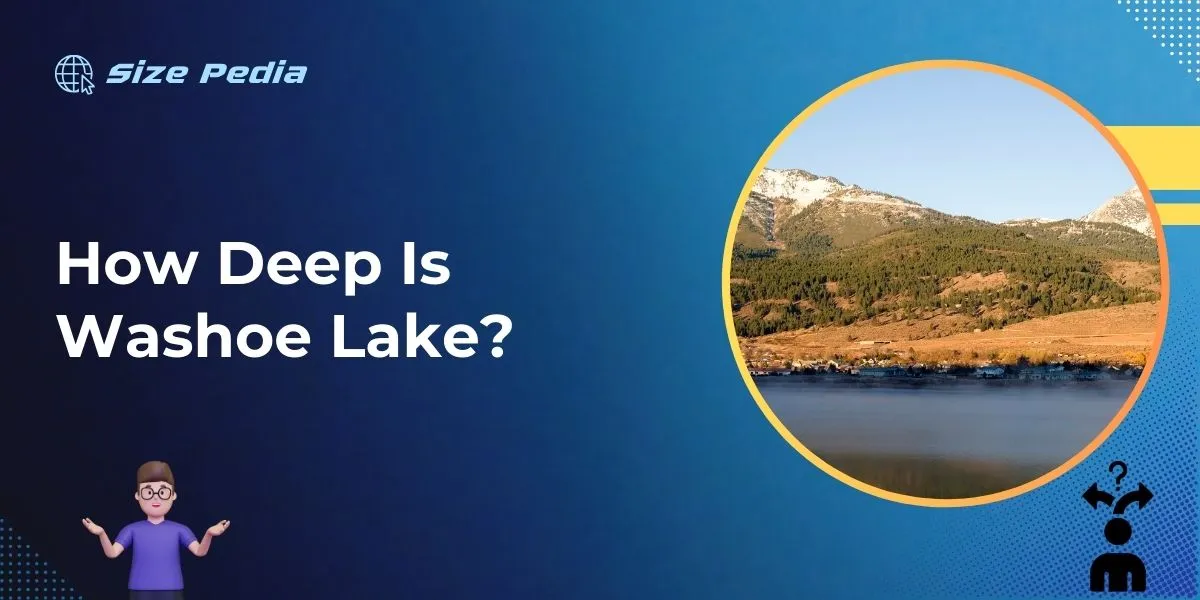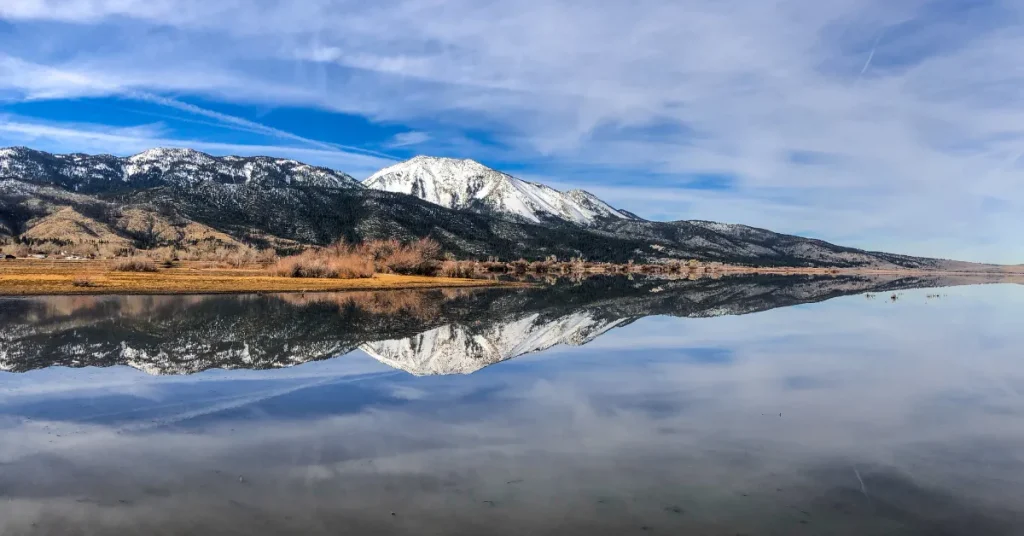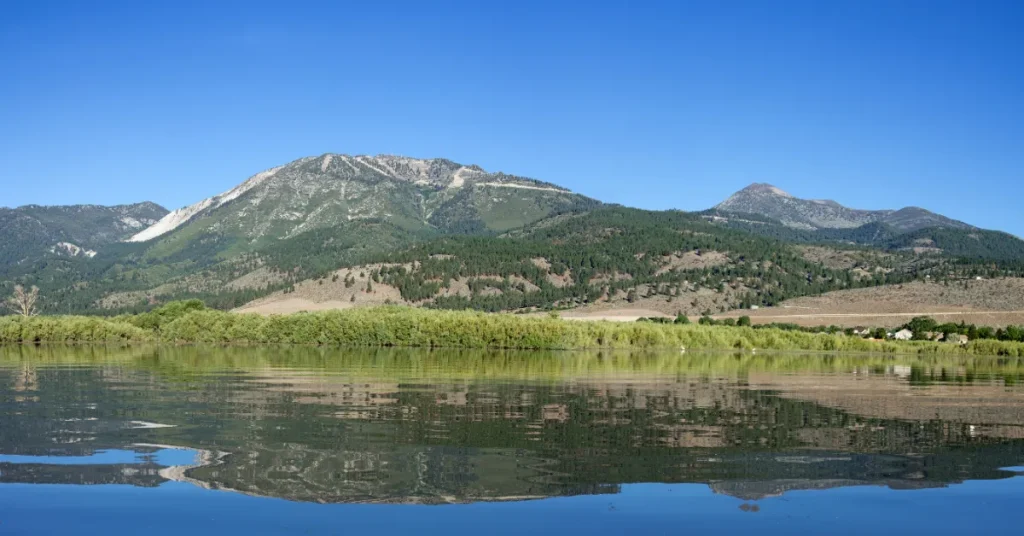Washoe Lake has an average depth of about 12 feet during normal conditions. Its maximum depth can reach up to 15 feet.
Nestled between the Carson Range and the Virginia Range, Washoe Lake is a popular destination in Nevada.
Just a short drive from Reno and Carson City, this natural jewel offers diverse recreational opportunities including fishing, windsurfing, and bird watching. Its relatively shallow depths make it especially attractive for families and novice anglers.
The lake, part of the Washoe Lake State Park, fluctuates in size dramatically with the seasons due to its low depth-to-surface-area ratio.
Variations in precipitation can vastly change the lake’s dimensions and depth each year, making it a unique ecosystem for wildlife and a fascinating subject for environmental studies.
Visitors take delight in the stunning scenic vistas and often catch glimpses of the diverse fauna that call Washoe Lake home.

Washoe Lake: A Natural Gem
Nestled in the heart of Nevada lies Washoe Lake, a natural wonder unique to the region. This tranquil body of water captures the hearts of visitors with its serene beauty and compelling depth.
Its changing depths and ecological significance make it a must-visit for nature enthusiasts.
Geographical Setting
Washoe Lake sits in a high valley basin near the eastern Sierra Nevada. The lake, framed by mountains, offers picturesque views and varied depth. The valley is a habitat for diverse wildlife and a treasured part of the state’s geography. Its shallow waters, affected by evaporation and precipitation, fluctuate often.
| Location | Size | Depth |
| Washoe Valley, NV | Approximately 5,800 acres | Average depth 12 feet |
Historical Significance
Washoe Lake boasts a rich history tied to the Washoe People. These Native Americans thrived here for centuries. The lake’s role during the Comstock Lode era was notable too. Settlers depended on its water for survival and agriculture.
- The Washoe Tribe used the lake for fishing and resources.
- The lake supported local communities during the silver mining boom.
- It has been a state park since 1977, preserving its historical and environmental legacy.
Measuring The Depths
Exploring the ‘Measuring the Depths’ of Washoe Lake brings us to a unique part of nature. Nestled between the Carson Range and the Virginia Range, the lake’s depth tells a story beyond the surface.
Methods Used To Determine Depth
Determining the depth of Washoe Lake requires precision and the right tools. Scientists and researchers use various methods:
- Echo sounding: This uses sound waves to measure depth.
- GPS mapping: GPS helps map lake contours accurately.
- Diving: Divers manually measure depths in specific locations.
- Drone technology: Advanced drones create detailed depth maps.
Latest Findings And Measurements
Recent studies show surprising figures. The latest data on Washoe Lake reveals:
| Location | Maximum Depth | Average Depth |
| Northern Basin | 12 feet | 6 feet |
| Southern Basin | 9 feet | 4 feet |
The fluctuating water levels, affected by weather and seasons, can change these depths. Washoe Lake is relatively shallow compared to other Nevada lakes.
Factors Affecting Washoe Lake’s Depth

Exploring the depth of Washoe Lake awakens our curiosity about the natural world. This majestic lake’s depth is not a constant measure. Several factors interplay to shape its watery realm.
Seasonal Variations
Nature’s rhythm heavily influences Washoe Lake’s depth. The ebb and flow of seasons bring significant changes to its waters. Here’s how seasons affect the lake’s depth:
- Winter: Snowmelt increases depth.
- Spring: Runoff from rains adds volume.
- Summer: Evaporation reduces water levels.
- Fall: Less precipitation, more stable depth.
Environmental Impact And Human Activity
The environment and humans leave their mark on Washoe Lake. Below are ways they impact the lake’s depth:
Table Headers
Table Row 1: Environmental Impact
Table Row 2: Human Activity
| Environmental Impact | Human Activity |
| Climate Change: Alters precipitation patterns. | Water Usage: Irrigation and consumption lower levels. |
| Droughts: Lead to reduced inflow. | Construction: Land development alters drainage. |
Comparative Analysis Of Lake Depths
Exploring the depths of lakes provides fascinating insights into aquatic ecosystems. When comparing lake depths, it’s crucial to understand that factors like geological activity, size, and climate conditions play significant roles.
This comparative analysis of lake depths will reveal how Washoe Lake measures up both locally and globally.
Washoe Vs. Nearby Lakes
Washoe Lake, nestled between the Sierra Nevada and the Virginia Range in Nevada, USA, holds its unique charm. Its depth is quite modest, especially when compared to its neighboring water bodies. Let’s see how it stands against nearby lakes.
| Lake Name | Maximum Depth (feet) |
| Washoe Lake | 12 |
| Lake Tahoe | 1,645 |
| Pyramid Lake | 350 |
Washoe Lake’s shallow depth is in stark contrast with the significant depths of Lake Tahoe and Pyramid Lake. This difference influences the types of fish and plant life each lake supports.
Global Perspective: Similar Sized Lakes Worldwide
For a global perspective, let’s compare Washoe Lake to similar-sized lakes around the world. Here are some that match Washoe Lake in surface area but differ in depth.
- Lake Eğirdir, Turkey – 328 feet
- Lake Pichola, India – 30 feet
- Lake Tisza, Hungary – 56 feet
These comparisons show that while surface area might be similar, the depth of a lake can vary greatly due to different factors such as geographical location and natural formation processes.
Washoe Lake stands as a shallow basin among its global peers, showcasing the diversity of lake environments.
Recreational Activities And Lake Depth

Washoe Lake sits nestled in the scenic Washoe Valley of Nevada. This natural gem offers activities like windsurfing, kiteboarding, and horseback riding. Its depth is an important factor for visitors looking to enjoy their favorite water activities.
Boating And Fishing Considerations
Boaters and anglers thrive on the diverse experiences that Washoe Lake provides.
Despite its shallow nature, the lake supports a variety of fish species.
Anglers can expect encounters with catfish, carp, and the prized Lahontan cutthroat trout.
Boat types should match the lake’s average depth. Smaller crafts fare better in these waters. Sailboats and canoes are popular choices. Larger boats may face some challenges due to the lake’s depth fluctuations.
Safety Implications For Water Sports
Safety stands paramount in any water sports endeavor.
The lake’s variable depth influences safety protocols.
Children and inexperienced swimmers should wear life jackets.
Water levels can change with the seasons, affecting how you enjoy the lake.
Below is a guide for safe engagement in water-related activities:
- Always check current lake conditions before outing
- Avoid overestimating your swimming abilities
- Stay within designated swimming areas
- Be aware of hidden underwater obstacles
With preparation and awareness of the lake’s depth, your visit can be both safe and enjoyable.
Conservation Efforts And Future Predictions
Conservation Efforts and Future Predictions play a critical role in safeguarding the natural beauty and ecological balance of Washoe Lake.
Nestled between the picturesque Sierra Nevada and the Virginia Range, this shallow lake remains a priority for environmental organizations and agencies.
With fluctuating water levels, the health of the lake’s ecosystem hinges on successful restoration and ongoing protection strategies.
Restoration Projects
The resilience of Washoe Lake depends on robust restoration projects. These initiatives focus on:
- Rehabilitation of damaged wildlife habitats.
- Control of invasive species to maintain biodiversity.
- Engagement in reforestation efforts around the wetlands.
- Upgrading recreational facilities to encourage eco-friendly tourism.
Through these vital projects, the lake’s vitality remains a beacon for conservationists looking to preserve the area’s natural allure for generations to come.
Challenges And Predicted Changes
The health of Washoe Lake faces significant trials. Key obstacles include:
- Climate change impacting water levels and temperature.
- Persistent droughts threatening the lake’s depth and ecosystem.
- Rapid urban development straining natural resources.
Scientists anticipate that these challenges may lead to notable changes such as:
| Aspect | Possible Future Change |
| Water Levels | Variability may increase with more extreme highs and lows. |
| Wildlife Populations | Shifts in native species and decrease in migratory birds. |
| Plant Life | Adaptation to drought-resistant species may dominate. |
Through continuous monitoring and adaptive management strategies, there is hope to navigate these changes and foster a thriving environment at Washoe Lake.
FAQs About How Deep Is Washoe Lake
What Is The Maximum Depth Of Washoe Lake?
Washoe Lake, situated in Nevada, reaches its maximum depth at about 12 feet or approximately 3. 7 meters. However, this can vary with seasonal changes and drought conditions, sometimes leading to much shallower waters.
How Does Washoe Lake’s Depth Affect Local Wildlife?
The depth of Washoe Lake influences the habitat for various bird species, including migratory waterfowl. Shallow waters create rich feeding grounds for birds but may limit fish populations, affecting the local aquatic food chain.
Are There Recreational Activities On Washoe Lake?
Yes, Washoe Lake offers a range of outdoor activities, including boating, windsurfing, and fishing. The lake’s depth varies, ensuring different areas are suitable for various recreational pursuits, depending on water levels and season.
Can You Swim In Washoe Lake?
Swimming is possible in Washoe Lake, though its relatively shallow depth may impact the experience. Swimmers should stay updated on current conditions, as water levels can influence the safety and enjoyment of swimming activities.
Conclusion
Exploring Washoe Lake reveals a dynamic depth, shifting with nature’s whims. Seasonal changes greatly influence its measurements, averaging between 12 to 24 feet.
This depth range highlights the lake’s adaptability, ensuring a fascinating visit each time. Remember, its beauty runs as deep as its waters.
For the latest updates, always check before you embark!
Resources:
1. https://parks.nv.gov/parks/washoe-lake
